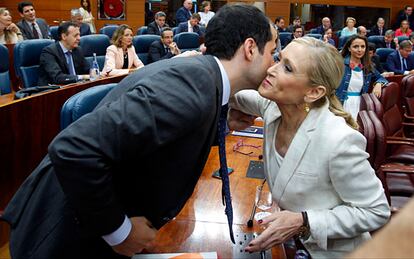Cristina Cifuentes becomes new Madrid regional premier
Conservative leader emerges as the standard-bearer for Popular Party regeneration

Cristina Cifuentes was invested as the Madrid region’s new premier on Wednesday with the 48 votes of her Popular Party (PP) and backing from emerging party Ciudadanos, which holds 17 seats in the regional assembly.
Ignacio Aguado, the Ciudadanos spokesman in the house, underscored that the party’s support was limited to Cifuentes’ instatement, and that there would be no ruling coalition with the conservatives over the next four years.
The leftist Socialists (37 seats) and Podemos (27 seats) voted against the new premier, but were one seat short of the majority required.
I want to correct mistakes, I want to adapt this project to what the citizens are asking us for”
Cristina Cifuentes, new regional premier of Madrid
The new regional chief faces the PP’s most uncertain tenure in the last 20 years. For the first time since 1995, the party does not have an absolute majority in the chamber, which will force Cifuentes to enter into vote-by-vote arrangements in order to pass legislation. As such, “to govern is to reach deals” has become her new motto.
During her investiture speech on Tuesday, 50-year-old Cifuentes was at pains to distance herself from her predecessors Esperanza Aguirre (2003-2012) and Ignacio González, whose tenures were marked by the Gürtel and Púnica corruption scandals, the Aneri training scheme fraud, and by the controversy over government attempts to privatize six regional hospitals.
“This is a time for courage and for challenges, a time with no room for forbearance or self-complacency,” she told the assembly, prompting questions as to whether she was indirectly criticizing her PP predecessors.
“Evidently, I am all about continuity,” she replied. “Both Esperanza Aguirre and Ignacio González have greatly transformed this region. They put it at the head of the economic recovery, and of employment.”
But then she added: “The thing is, I want to correct mistakes, I want to adapt this project to what the citizens are asking us for. We need to be more approachable, we need to listen to the citizens.”
The new leader has already made it clear that she will not be continuing the healthcare privatization effort, and that the Canal de Isabel II regional water company will remain 100 percent public.
“I plan to improve everything that is improvable,” said Cifuentes, who is fast becoming the standard-bearer for an internal regeneration within the PP. The former government delegate in the Madrid region has already expressed support for party primaries and the elimination of partial legal immunity for certain politicians.
Long on promises, short on funding?
However, it remains to be seen how Cifuentes will finance all the social policies she included in her campaign promises, as well as those tacked on by Ciudadanos as part of its conditions for supporting her.
Cifuentes wants to extend youth discounts for public transport passes, spend €30 million more on primary healthcare, hire 500 new high-school teachers, slash nursery and kindergarten education fees by 20 percent, and extend a €100 annual “cultural check” to under-30s and seniors over 65.
But deficit targets mandate a €600 million budget cut this year, which comes on top of the more than €4 billion already slashed since 2012.
So far, at least one change is already being felt in the new assembly, in the form of the willingness of party spokespeople to discuss issues in a civilized manner, a far cry from the confrontational style that defined the Madrid assembly under Ignacio González and opposition Socialist (PSOE) leader Tomás Gómez. Politeness was the rule during the two-day investiture session, in lieu of the exchanges of insults that previously took place here between the PP and the PSOE.
Tu suscripción se está usando en otro dispositivo
¿Quieres añadir otro usuario a tu suscripción?
Si continúas leyendo en este dispositivo, no se podrá leer en el otro.
FlechaTu suscripción se está usando en otro dispositivo y solo puedes acceder a EL PAÍS desde un dispositivo a la vez.
Si quieres compartir tu cuenta, cambia tu suscripción a la modalidad Premium, así podrás añadir otro usuario. Cada uno accederá con su propia cuenta de email, lo que os permitirá personalizar vuestra experiencia en EL PAÍS.
En el caso de no saber quién está usando tu cuenta, te recomendamos cambiar tu contraseña aquí.
Si decides continuar compartiendo tu cuenta, este mensaje se mostrará en tu dispositivo y en el de la otra persona que está usando tu cuenta de forma indefinida, afectando a tu experiencia de lectura. Puedes consultar aquí los términos y condiciones de la suscripción digital.








































